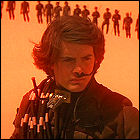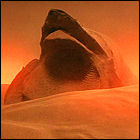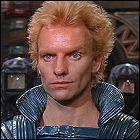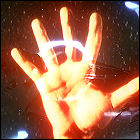 Padishah Emperor Shaddam IV is on the receiving end of a rare personal visit from a Navigator of the Spice Guild: his longtime hold over the life-extending, interstellar-travel-enabling Spice Melange may be at an end. The Navigators foresee a “problem” involving the son of Duke Leto Atreides, ruler of the planet Caladan, and chief competitor of the spice-mining operation run by Baron Vladimir Harkonnen, ruler of planet Geidi Prime…and personal pick of the Emperor to mine the spice found only on the planet Arrakis, known informally as Dune. The Emperor’s concubine, a member of the telepathic Bene Gesserit sisterhood, sets about trying to learn about Atreides’ son, Paul. As the male child of another Bene Gesserit woman, Paul may indeed pose a great threat to the existing balance of power.
Padishah Emperor Shaddam IV is on the receiving end of a rare personal visit from a Navigator of the Spice Guild: his longtime hold over the life-extending, interstellar-travel-enabling Spice Melange may be at an end. The Navigators foresee a “problem” involving the son of Duke Leto Atreides, ruler of the planet Caladan, and chief competitor of the spice-mining operation run by Baron Vladimir Harkonnen, ruler of planet Geidi Prime…and personal pick of the Emperor to mine the spice found only on the planet Arrakis, known informally as Dune. The Emperor’s concubine, a member of the telepathic Bene Gesserit sisterhood, sets about trying to learn about Atreides’ son, Paul. As the male child of another Bene Gesserit woman, Paul may indeed pose a great threat to the existing balance of power.
Paul, in the midst of training to accompany his father to Arrakis, begins to experience visions of strange places and events, full of names and faces unknown to him. On Arrakis, Duke Leto Atreides impresses the local spice harvesters with his compassion and non-dictatorial attitudes, a distinct change from the iron-fisted rule of House Harkonnen. But the Harkonnen, eager to regain sole control over the spice, have set traps within traps: Leto’s personal doctor has been swayed against him, and multiple assassintation attempts are hatched. Finally, a brute-force assault puts Paul and his mother on the run, while Leto falls int othe hands of Baron Harkonnen.
Paul and his mother encounter the Fremen, desert warriors native to Arrakis, who defy the planet’s fierce desert climate with hidden stockpiles of water. The Fremen need a leader to fend off the inevitable campaign by the Harkonnen to re-enslave everyone on Arrakis, and in Paul, they find the prophesied leader. Paul must survive numerous challenges and introduce the Fremen to his ways if he is to avenge his father, overthrow the corrupt Emperor, and bring peace to Arrakis.
screenplay by David Lynch (credited in extended edition as Judas Booth)
based on the novel by Frank Herbert
directed by David Lynch (credited in extended edition as Alan Smithee)
music by Toto
Prophecy Theme by Brian Eno, Daniel Lanois and Roger Eno
Cast: Francesca Annis (Lady Jessica), Leonardo Cimino (The Baron’s Doctor), Brad Dourif (Piter De Vries), José Ferrer (Padishah Emperor Shaddam IV), Linda Hunt (Shadout Mapes), Freddie Jones (Thufir Hawat), Richard Jordan (Duncan Idaho), Kyle MacLachlan (Paul Atreides), Virginia Madsen (Princess Irulan), Silvana Mangano (Reverend Mother Ramallo), Everett McGill (Stilgar), Kenneth McMillan (Baron Vladimir Harkonnen), Jack Nance (Captain Iakin Nefud), Sian Phillips (Reverend Mother Gaius Helen Mohiam), Jürgen Prochnow (Duke Leto Atreides), Paul Smith (The Beast Rabban), Patrick Stewart (Gurney Halleck), Sting (Feyd Rautha), Dean Stockwell (Dr. Wellington Yueh), Max von Sydow (Dr. Kynes), Alicia Roanne Witt (Alia Atreides), Sean Young (Chani), Danny Corkill (Orlop), Honorato Magalone (Otheym), Judd Omen (Jamis), Molly Wryn (Harah)
LogBook entry and review by Earl Green
Review: For fans of classic SF prose, Dune seemed to be eagerly awaited and dreaded in equal measure. Frank Herbert’s legendary novel had defied all attempts to film it prior to Dino de Laurentiis acquiring the rights. (A previous attempt, by director Alejandro Jodorowsky, never got beyond extensive pre-production. That alone might have finally convinced Hollywood that the book was unfilmable, except that in the wake of Star Wars, every science fiction film that had been on the bubble of either being made or not being made was suddenly, somewhere, greenlit.)
 Even more bizarrely, in retrospect, was handing the movie to decidedly un-commercial director David Lynch, years before Blue Velvet or Twin Peaks. Lynch also wrote the script, already a mess because it had to clumsily illuminate a huge amount of internal dialogue, and the cast probably could’ve used a bit more help in interpreting it. The cast is top-heavy with legendary performers, but the information-dense script, equally top-heavy on explanatory “thinking to myself” voice-overs that wouldn’t be added until post-production, which couldn’t have made the cast’s job any easier.
Even more bizarrely, in retrospect, was handing the movie to decidedly un-commercial director David Lynch, years before Blue Velvet or Twin Peaks. Lynch also wrote the script, already a mess because it had to clumsily illuminate a huge amount of internal dialogue, and the cast probably could’ve used a bit more help in interpreting it. The cast is top-heavy with legendary performers, but the information-dense script, equally top-heavy on explanatory “thinking to myself” voice-overs that wouldn’t be added until post-production, which couldn’t have made the cast’s job any easier.
At the heart of the problem is that Dune, with its sprawling backstory and universe-building, simply doesn’t lend itself to other meida. This is a story that, arguably, didn’t need to be a movie. After spending much of its first half on exposition and backstory, the remaining running time of the film rockets from one major event to the next, sometimes taking huge leaps of story logic to get from point A to point B. Why do Paul and Chani suddenly fall in love? Because the book said they did. If there was any hope that  Dune the movie would drive people toward Dune the book, it was probably lost soon after opening weekend; instead, one almost has to have read the book to have a chance in hell of following the movie.
Dune the movie would drive people toward Dune the book, it was probably lost soon after opening weekend; instead, one almost has to have read the book to have a chance in hell of following the movie.
The marketing tagline “a world beyond your experience, beyond your imagination” is apt, but it’s a double-edged sword. Dune offers the uninitiated audience very little with which to identify. Where Star Wars had identifiable elements in the shape of a reasonably normal hero faced with extraordinary circumstances, Dune starts out with barely-identifiable people doing barely-identifiable things. That off-putting effect is compounded by the vast amounts of narration required to explain what’s going on; there’s simply too much background to introduce gracefully or organically. With all of that narration, wouldn’t a straight-up audio book have been a better solution than a movie?
 What impact Dune does have as a movie is almost entirely down to Anthony Masters’ production design, Bob Ringwood’s costumes, and a score by Toto (with contributions from Brian Eno) that manages to combine wide-screen epic with Toto’s usual ’80s rock style. The cast is almost uniformly excellent: the qualifier “almost” really applies to the fact that the actors fall into two categories: “stellar” and “Sting”. In his minor role as Feyd-Rautha, Sting is never really convincing as a born-and-bred assassin. (Interestingly, Jodorowsky wanted Mick Jagger in that role, so something evidently screamed “rock star” to every potential Dune director down through the years.)
What impact Dune does have as a movie is almost entirely down to Anthony Masters’ production design, Bob Ringwood’s costumes, and a score by Toto (with contributions from Brian Eno) that manages to combine wide-screen epic with Toto’s usual ’80s rock style. The cast is almost uniformly excellent: the qualifier “almost” really applies to the fact that the actors fall into two categories: “stellar” and “Sting”. In his minor role as Feyd-Rautha, Sting is never really convincing as a born-and-bred assassin. (Interestingly, Jodorowsky wanted Mick Jagger in that role, so something evidently screamed “rock star” to every potential Dune director down through the years.)
Virtually everyone else in the movie is exceptional, which may be Dune‘s singular artistic achievement: most of the cast rises above the confusing material and make it compelling viewing, even though they can’t conjure up story logic and flow that are not present in the script. None of the cast suffered from being in this movie, and Kyle MacLachlan and Jack Nance would become frequent members of Lynch’s unofficial recurring repertory company, appearing in his later movies and TV projects. And like it or not, the production design of Lynch’s film has had a seismic impact on virtually all later attempts to visualize the Dune-iverse. Additionally, many later science fiction epics have borrowed liberally from the  visual lexicon of Lynch’s Dune (witness Babylon 5’s “great hand reaching out of the stars” and its bald Centauri prophetesses, or the 456 of Torchwood: Children Of Earth’s strong resemblance to the Guild Navigator in its smoke tank).
visual lexicon of Lynch’s Dune (witness Babylon 5’s “great hand reaching out of the stars” and its bald Centauri prophetesses, or the 456 of Torchwood: Children Of Earth’s strong resemblance to the Guild Navigator in its smoke tank).
Dune had the disadvantage of following in the footsteps of Star Wars. As nutty as Jodorowsky’s ten-hour, LSD-trip-inspired take on Herbert’s novel sounds, there is this to consider: a pre-1977 movie take on Dune might’ve stood a better chance of being true to the source material. The book itself is an extremely dense text and requires actual study; that might’ve been fleshed out better in the early 1970s, when snappy, compact running times and pleasing an audience weaned on summer blockbusters were less of a concern. Dune often looks and sounds great, but story coherence is a casualty. The movie wants to rush from one major incident to the next, hoping it can narrate its way around the lack of connecting tissue and story logic, and not quite succeeding.
Not every major science fiction novel needs to be a movie.



